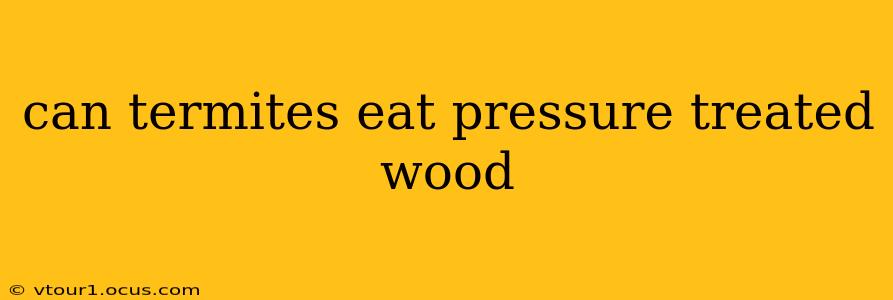Can Termites Eat Pressure-Treated Wood?
The short answer is: it depends. While pressure-treated wood is designed to deter insect infestations, including termites, it's not a foolproof guarantee. The effectiveness hinges on several key factors. This article will delve into the specifics, answering common questions about termite resistance in pressure-treated lumber.
What Chemicals are Used in Pressure-Treated Wood?
Pressure-treated wood typically contains preservatives, most commonly chromated copper arsenate (CCA), copper azole (CA-B), or alkaline copper quat (ACQ). These chemicals are designed to make the wood toxic to insects like termites, preventing them from feeding and surviving. The type and concentration of the preservative significantly impact the wood's resistance. Older CCA-treated lumber, while effective, contained arsenic, prompting its phase-out in residential applications in the early 2000s. Current treatments focus on copper-based compounds which are less toxic.
How Effective is Pressure-Treated Wood Against Termites?
Pressure-treated lumber offers a degree of protection against termites, but it's not impenetrable. The effectiveness depends on factors like:
- Type of Preservative: ACQ and CA-B are generally considered effective against termites, but their efficacy can decline over time, especially with exposure to the elements.
- Concentration of Preservative: Higher concentrations offer better protection. Lumber treated to higher standards is more resistant.
- Type of Termite: Some termite species are more resistant to certain preservatives than others.
- Wood Species: Certain wood species naturally offer more resistance to decay and insect infestation, even without pressure treatment.
- Environmental Conditions: Exposure to moisture, sunlight, and ground contact can gradually reduce the effectiveness of the preservatives over time.
Can Termites Still Infest Pressure-Treated Wood?
While less likely than with untreated wood, termites can still infest pressure-treated lumber under certain circumstances. Prolonged exposure to the elements can leach out the preservatives, rendering the wood less effective. Termites may also find ways to circumvent the treated areas, particularly if they have already established a large colony.
What are the signs of termite infestation in pressure-treated wood?
Even with pressure-treated wood, it's crucial to be vigilant. Signs of termite infestation can include:
- Mud tubes: These are tunnels constructed by subterranean termites to access wood from the soil.
- Wood damage: Look for hollow-sounding wood, frass (termite droppings), or visible termite activity.
- Swarmers: These are winged reproductive termites that emerge from colonies, often indicating a larger problem.
How can I protect pressure-treated wood from termites?
While pressure treatment provides a level of protection, further steps can enhance termite resistance:
- Proper installation: Ensure the wood isn't in direct contact with the ground. Use concrete footings or other barriers to create a gap between the wood and the soil.
- Regular inspections: Conduct regular inspections, especially in high-risk areas, to detect any signs of termite activity early.
- Termite barriers: Consider using physical barriers, such as metal mesh or plastic sheeting, to prevent termites from accessing the wood.
- Professional termite treatment: Consult a pest control professional for preventative treatments or to address existing infestations.
Is it safe to use pressure-treated wood in contact with soil?
While pressure-treated wood is more resistant to decay and insects, it's generally recommended to avoid direct ground contact whenever possible. Elevated structures and proper installation techniques can significantly extend the lifespan and effectiveness of the treated lumber.
In conclusion, while pressure-treated wood offers significant protection against termites, it’s not a complete guarantee. Regular inspections, proper installation, and proactive measures are essential for ensuring long-term protection against these destructive insects. If you suspect a termite infestation, consulting a qualified pest control professional is highly recommended.
